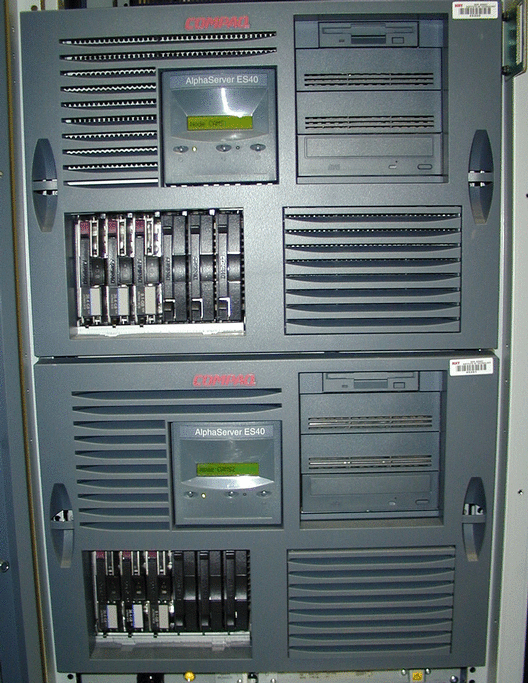

Each of cams1.njit.edu and cams2.njit.edu is an ES40 Alphaserver
platform with four 833 MHz 21264 Alpha CPUs (EV6.8) and 4 GB of RAM.
Both run Tru64 v. 5.1B UNIX and are AFS clients with local disk space
assigned to each user for use in computational tasks (you should make
use of this disk space if your code reads/writes to disk often, your login
directory is not local to these computers). Logins require usage of ssh or ssh -X. Assuming
your username is UCID then your local disk
space on each computer is in directory /research/faculty/UCID
or /research/student/UCID.  NOTE: the local disk space is not common
to both machines, only your login directory is configured to be common.
These computers are to be used only for scientific computing; neither
mail nor word-processing software is installed. The netscape browser should
only be used to look at manuals; netscape on Tru64 is unstable and liable
to quit on you if the webpages you view contain alot of Java script stuff.
The default printing queue is math615bw (CUL615 black & white printer) with
math615co (the color printer in CUL615) as the alternative.
NOTE: the local disk space is not common
to both machines, only your login directory is configured to be common.
These computers are to be used only for scientific computing; neither
mail nor word-processing software is installed. The netscape browser should
only be used to look at manuals; netscape on Tru64 is unstable and liable
to quit on you if the webpages you view contain alot of Java script stuff.
The default printing queue is math615bw (CUL615 black & white printer) with
math615co (the color printer in CUL615) as the alternative.
All the usual GNU software useful in scientific computing is available on these two computers, e.g., gnuplot, xmgr, xfig, etc. Let our systems administrators know (use link on right hand side) if you need something that's not currently installed. Here's the freeware page should you want to see what's available from HP. Both cams1.njit.edu and cams2.njit.edu run Mathematica and Matlab, as well as the scientific visualization packages ENSIGHT (talk to Dan Goldman if you'ld like to use this) and TECPLOT (talk to Lou Kondic if you'ld like to use this). A simple graphics library I use for debugging (VOGLE/VOPL) is available in /usr/lib/libvopl.a and /usr/local/lib/libvogle.a .
The compilers provide all flavors of Compaq/HP FORTRAN, C, and C++. See here for FORTRAN manuals of all sorts. In addition, the KAP FORTRAN pre-processor is available for use code optimization and/or parallelization using threads/OpenMP (man pages are provided on each computer, e.g., man kf90 results in information). The CXML and SCIPORT math libraries are installed. CXML provides linear algebra, signal-processing, etc., serial and parallel libraries. The GNU compilers are not installed.
Although these computers are SMP machines, they can also be used to test/debug and run MPI codes. Use the regular compilation command (there's no mpif77, etc.) and link with -lmpi -pthread (for C/C++ codes) or with -lfmpi -lmpi -pthread (for FORTRAN codes). To run your compiled MPI code named exec with, e.g., 4 processes (threads) use dmpirun -np 4 ./exec . Users who desire more extensive High-Performance FORTRAN and OpenMP information can click here or here for the Compaq MPI manual. The Compaq ScaLAPACK library for use in MPI codes is installed under /usr/local/scalapack.1.0.0-1 (see the Netlib manual here); MPI codes linking this library must also link with the CXML library. Finally, in /research/faculty/peterp/Libs.d you will find the FFTW lib and include directories; I built v. 2.1.5 with OpenMP and MPI support using the Compaq compilers. Also in this directory you'll find the serial/parallel versions of the latest SUNDIALS ode-solving library out of Lawrence Livermore Labs. Periodically I will add stuff in /research/faculty/peterp/Libs.d for general use and will advertise it here. Right now (12/07/05) there's only FFTW and SUNDIALS.